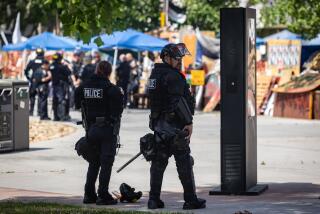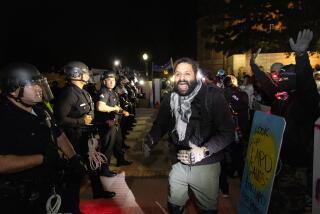China Declares Partial Martial Law After Protesters Turn Away Troops
- Share via
BEIJING — Chinese authorities, in a desperate effort to crack down on student protesters in what has become the biggest anti-government demonstration since the 1949 Communist revolution, imposed martial law “in certain areas” of the capital Saturday, hours after thousands of people formed human barricades to successfully block convoys of troops that had been ordered into the city.
The state-run New China News Agency said martial law began at 10 a.m. local time. It said no curfew was imposed, and no date was given for lifting martial law.
The government ordered the Cable News Network to halt transmissions, and the network had to end its coverage at about 7:10 p.m. PDT. CBS also said officials cut off its transmissions. CNN had been reporting from Beijing as part of the coverage of the history-making visit by Soviet President Mikhail S. Gorbachev earlier last week.
CNN reported that even China Central Television, the state-run network, had been shut down after the martial-law order was broadcast.
Sources said Communist Party chief Zhao Ziyang, who opposed such a crackdown, has offered to resign, but that the party had not acted on his offer.
‘Have You No Feelings?’
“We are people and you are people! Why do you have no feelings?” one demonstrator shouted at the soldiers, who were deployed shortly after midnight in a bid to end the protests that have paralyzed this capital and caused nationwide turmoil.
After daybreak Saturday, most of the troops were reported still on the outskirts. Military helicopters made repeated low runs over the city, a rare sight.
About 15 trucks, each filled with about two dozen soldiers, turned around and drove back the way they came after about 500 students and supporters surrounded them for several hours in western Beijing and tried to persuade them to leave. Roadblocks were set up across the capital, as people moved cars and other large objects into intersections.
“You should think about what you are doing,” one young man said earnestly, standing on a truck’s rear bumper and looking in the faces of about a dozen soldiers. No weapons were visible.
Soldiers Smiled, Waved
When the trucks turned around, the crowd cheered and some soldiers smiled, waved and flashed V-for-victory signs.
At least 225 trucks and 50 vans filled with soldiers were blocked by thousands of demonstrators in western Beijing alone. Soldiers also moved into Shanghai, the scene of similar demonstrations on Thursday and Friday.
Premier Li Peng, in a nationwide radio and television broadcast that was aired shortly after midnight, said the protesters were being manipulated by people who wanted to overthrow the government.
President Yang Shangkun, in issuing a directive on the troop deployment, said the army’s task was to protect important ministries and key installations. Neither he nor Li used the words “martial law” to describe the deployment, but they made clear the army was in charge of restoring order.
Nationally Televised Address
Zhao was not visible in the audience as Li and Yang announced the troop deployment in a nationally televised address on Saturday morning, shortly after midnight. Also not shown was senior leader Deng Xiaoping, 84, believed to be the main force behind the crackdown.
But the announcement only appeared to stiffen the demonstrators’ resolve and boost popular support for their demands for freedom and democracy.
After the broadcast, some students at Tian An Men Square said they would resume a week-old hunger strike, which had been called off late Friday.
By 4 a.m., reporters estimated that nearly 200,000 people had gathered in the square. Demonstrating students said they would remain passive if soldiers tried to move them and would continue their sit-in until the government agrees to a dialogue on reforms including a free press and an end to official corruption.
“Tonight we have to stay here for the future of China,” said a student from the central city of Hangzhou.
U.S. Reaction
In Washington, the United States said Friday it regretted that China had ordered military action restricting the freedoms of student-led anti-government protests.
“The United States supports freedom of speech, association and peaceful assembly in China as in the rest of the world,” the State Department said. “We regret that military action has been ordered with the aim of restricting those freedoms.”
The State Department also expressed hope that the dialogue promised by Chinese authorities in announcing the movement of troops into Beijing and Shanghai would be pursued.
The student protests, which began in mid-April, have evolved into a nationwide movement and represent the biggest show of defiance in China’s 40 years of communist rule. They overshadowed the visit by Gorbachev, who returned to Moscow Thursday.
Thousands of Beijing residents on Saturday flocked to Tian An Men by truck, motorcycle and on foot to protect the students.
Women Cried, Men Yelled
By late morning, an estimated 100,000 people were in the square, and an equal number filled nearby streets. Women cried, men yelled and loudspeakers blared. Police sirens wailed throughout the city, and one police vehicle chased several trucks of banner-waving student supporters.
No soldiers were seen in the 100-acre square in central Beijing, which students have turned into a tent city and parade ground for their marches.
Li announced the army’s intervention in a speech to military and civilian officials at the Great Hall of the People, which looks out on the square.
“We must adopt firm and resolute measures to end the turmoil swiftly, maintain the leadership of the party as well as the socialist system,” Li said, speaking in an agitated manner and occasionally waving his fist.
The audience applauded several times but looked grim.
Li appealed to the students to end their protest, leave the square and “recover their health as soon as possible.”
‘Give No Support to Students’
He also called on people “in all walks of life to immediately stop all demonstrations, and give no more so-called support to the students in the interests of modernization.”
Li, widely seen as a conservaitve, described Beijing as in a state of anarchy.
“To ensure social order and the stability of Beijing . . . the People’s Liberation Army has no alternative but to enter and be garrisoned in the capital.
“We have been reasonable for more than one month. In the world there’s no government like that,” Li said. “The Communist Party will resolutely deal with all turmoil and not allow it to interfere with society.”
He said that “a handful of persons” were seeking to “negate the leadership of the Communist Party of China and the socialist system.”
“(They) are using the hunger strikers as hostages to coerce and force the party and the government to yield to their political demands,” Li said.
He also said the demonstrators had “damaged the international prestige” of China by disrupting the program for the summit visit by Gorbachev.
Drowned Out the Broadcast
The students in the square drowned out the broadcast by singing the “Internationale,” the worldwide socialist anthem. They also chanted, “Li Peng, step down!”
Yang, regarded as a figurehead with little political power, spoke next. He said troops were sent in “to protect Beijing society, its people and its future. We were forced to send the Liberation Army into the city.”
Beijing university students began protesting for democracy on April 15, after the death of former Communist Party chief Hu Yaobang, revered as a reformer. He was forced to resign in 1987 for failing to crack down on earlier student demonstrations and was replaced by Zhao.
Non-students cheered the initial protests, but relatively few took part in the marches until the hunger strike began a week ago. Then, fearful for the students’ lives and angered by the government’s refusal to talk to them, people from every walk of life joined in.
Soldiers and police marched with the doctors, teachers, factory workers, schoolchildren and dancing troupes.
Protests also broke out in more than 20 other cities, including Shanghai, where witnesses said about 500,000 students and workers marched on Friday.
Troops Deployed in Shanghai
Early Saturday, about 500 Chinese troops moved into the center of the city to try to remove those demonstrators who were protesting outside city government offices on the waterfront.
The troops, who were unarmed, tried to usher the students into buses and a few were driven away. But most of the 6,000 students refused to go and thousands more demonstrators poured into the center of the city, China’s biggest, to show their support.
Student-led protests in Shanghai earlier in the week had forced Gorbachev to abandon plans to visit the center of the historic city.
A public address system broadcast a statement by Shanghai mayor Zhu Rongji saying: “You should all leave in an orderly manner. We can still conduct dialogue.”
Defiant students yelled back at the loudspeakers: “Get out. Get out.”
More to Read
Sign up for Essential California
The most important California stories and recommendations in your inbox every morning.
You may occasionally receive promotional content from the Los Angeles Times.













